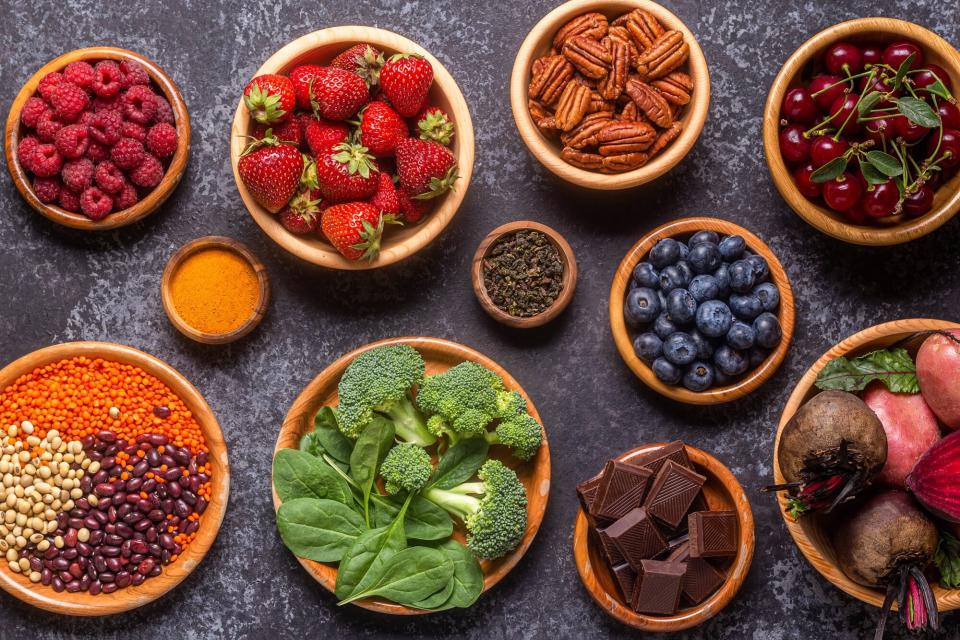8 Antioxidant-Rich Foods That Can Easily Be Added to Your Diet
TABLE OF CONTENTS
On This Page
Berries
Dark Leafy Greens
Dark Chocolate
Beans
Beets
Orange Vegetables
Peppers
Nuts
The foods and beverages you consume have a direct impact on your health, which is why it's important to enjoy a diet loaded with nutrient-rich foods. A quick search will tell you that one of the easiest ways to promote heart health, reduce inflammation, and minimize the risk of diseases like Alzheimer's and cancer is to incorporate antioxidants into your diet.
"Antioxidants are compounds found in food that help balance free radicals," says Rahaf Al Bochi, RDN, LD, spokesperson for the Academy of Nutrition and Dietetics and owner of Olive Tree Nutrition LLC. "A high level of free radicals in the body can cause oxidative stress, which is linked to chronic diseases such as cancer, heart disease, and autoimmune disorders." Free radicals are produced in the body naturally, but the process can be exacerbated by environmental exposure to things like pollution, cigarettes, and medications.

GETTY IMAGES
On the bright side, antioxidant nutrients—which are found in vitamins C and E, beta-carotene, and selenium—can protect your body from these harmful reactions. One way to get antioxidants is to consume foods that have them naturally. Cara Harbstreet, MS RD LD of Street Smart Nutrition says you can do this by maintaining a colorful diet rich with plant-based whole foods, such as fruits and vegetables.
Related: 10 Foods to Eat for Healthy Living
Berries
According to Lesley McDonalds, MA, RDN, LD, a registered dietitian and instructor at the University of Alabama, "blueberries are among the fruits with the highest level of antioxidants." Additionally, red berries including raspberries, strawberries, and cranberries are all antioxidant-rich. One thing these fruits have in common is that they contain anthocyanin, a phenolic compound that's responsible for the colors red, purple, and blue in fruits and vegetables.
Besides being used as natural colorants, fruits containing anthocyanin have been used to treat various diseases. The water-soluble pigments reduce the risk for diabetes, cancer, and inflammation, as well as cardiovascular disease by minimizing levels of bad cholesterol and increasing good cholesterol.
Dark Leafy Greens
Vegetables like kale and spinach contain a whole host of important nutrients. The leafy greens are packed with vitamins C and E, which act as antioxidants. According to Harvard's School of Public Health, kale contains carotenoids including beta-carotene, which is converted into vitamin A—a nutrient that helps prevent cognitive decline and maintains skin health.
Kale is a cruciferous vegetable, like broccoli and cabbage, which also contain carotenoids. Another dark leafy green that is antioxidant and nutrient dense is spinach. The vegetable contains vitamin E, a fat-soluble vitamin that acts as an antioxidant by reducing damaging free radicals. It also improves immune function and reduces the risk of clots in heart arteries.
Dark Chocolate
Experts also approve of dark chocolate as a source of antioxidants. "Since dark chocolate has more cocoa than regular chocolate, it is another nutritious source to consume minerals and antioxidants," Harbstreet explains. Additionally, dark chocolate has been known to improve heart health due to its flavonoid content, which acts as an antioxidant, McDonald says.
Flavonoids are a group of natural substances that are found in fruits, vegetables, grains, flowers, tea, and wine. They have anti-oxidative, anti-inflammatory, and anti-carcinogenic properties that may reduce the risk of cancer and Alzheimer's disease. It is important to note that dark chocolate should be enjoyed in moderation. "Choose pure dark chocolate barks over chocolate that contains a high amount of added sugars to reap the health benefits," Rahaf states.
Beans
"Berries can sometimes be an expensive produce item but beans are another excellent source of antioxidants that are healthy and affordable," Harbstreet says. The legumes contain phenolic compounds, which act as antioxidants by counteracting harmful free radicals. It's important to note that in a study conducted by the National Library of Medicine, beans with colored coats (red, cream, black, pink, and brown) were found to be more efficient antioxidants than those with completely white coats.
Related: Smart Ways to Shop Healthy at the Grocery Store, According to a Registered Dietitian
Beets
Consuming foods rich in vitamin C—which McDonald says naturally contains antioxidants—is essential for your overall health. One way to pack your diet with vitamin C is by consuming beets. The beautiful, dark purple root vegetable is one Harbstreet says contains powerful antioxidants that can neutralize free radicals. Beyond possessing antioxidants, vitamin C is valuable in preventing colds and some chronic diseases.
Orange Vegetables
One of the easiest ways to maintain a diet rich in antioxidants is to eat foods rich in color, such as orange vegetables like sweet potatoes and carrots. According to Harbstreet, these foods are an "abundant source of the antioxidant carotene."
Carotenoids are natural pigments that are responsible for the bright colors of various fruits and vegetables. As with all antioxidants, carotenoids can reduce harmful free radicals in the body. When consumed, carotenoids are broken down into vitamin A, which is critical to maintaining a healthy immune system.
Peppers
According to McDonald, yellow and green bell peppers possess essential antioxidants. The colorful vegetables contain vitamin C which—beyond containing antioxidants—is essential for collagen production, a protein in connective tissue that runs throughout the body. Red bell peppers also contain its own set of health benefits, as the vegetable is rich in vitamin E, another vitamin that contains antioxidants and has been shown to reduce the risk of heart disease.
Nuts
"Nuts, such as pecans and walnuts, can raise antioxidant levels in the blood and are a good source of healthy fats, fiber, and micronutrients like vitamins and minerals, as well," says Harbstreet. Some nuts, like Brazil nuts, contain selenium, a mineral that stimulates the production of killer T-cells which find and destroy infected cells. Additionally, selenium acts as a powerful antioxidant as it protects against oxidative stress from free radicals.
